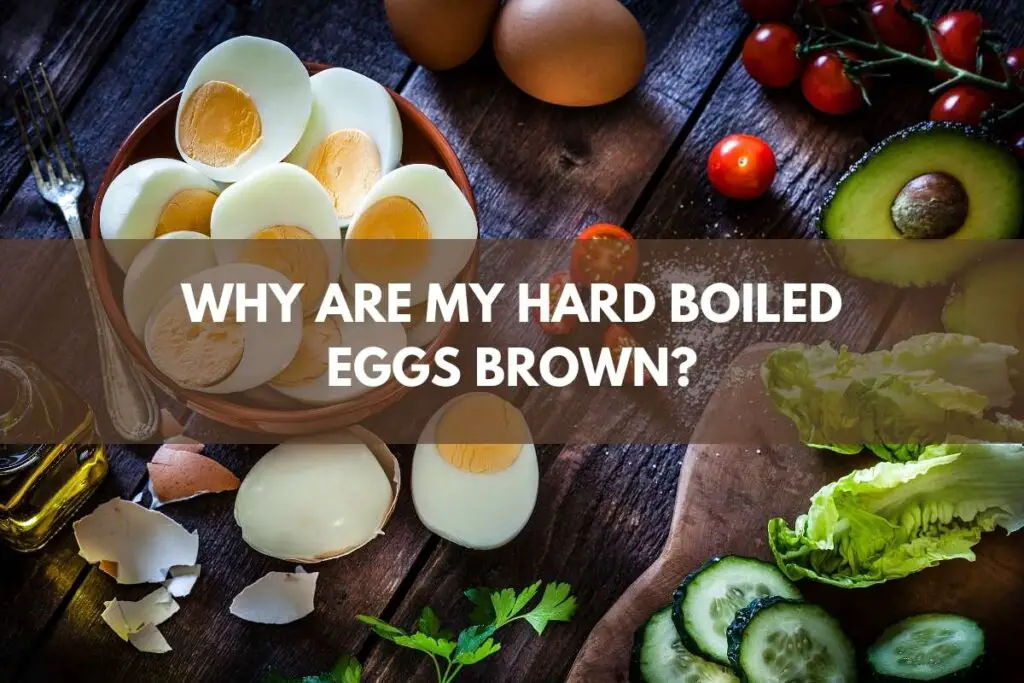If you’ve ever wondered why your hard-boiled eggs are brown, you’re not alone. This common cooking conundrum has puzzled egg lovers for years. The short answer is that brown eggs are simply older than white eggs.
When an egg is first laid, it has a thin outer membrane that protects it from bacteria. This membrane breaks down over time, allowing oxygen to reach the egg’s iron-rich yolk.
This reaction causes the yolk to turn brown. So, if you’re looking for the freshest eggs, stick to white ones. But brown eggs are just as delicious if you don’t mind a little extra color in your breakfast.
There are a few reasons why your hard-boiled eggs might be brown. One possibility is that you overcooked them, which can cause the egg yolks to become darker in color.
Another possibility is that your eggs are older, and the yolks start turning brown naturally. If you’re concerned about the browning, you can try cooking the eggs for a shorter amount of time or using fresher eggs.

If you’ve ever cooked a hard-boiled egg, you know that the shell can sometimes come out looking a little less than perfect. But why are my hard-boiled eggs brown?
It turns out that there are a few reasons why this can happen. First, if the eggs are old, the shells can start to break down and allow oxygen to seep in, which can cause them to brown.
Second, if the water you’re boiling the eggs in is too hot, the proteins in the egg can start to denature and turn brown.
Finally, if you’re not cooking the eggs long enough, the yolks can start to oxidize and turn brown. So, if you’re looking for perfectly cooked hard boiled eggs, make sure to use fresh eggs and cook them for the appropriate amount of time.
Contents
Why are my hard boiled eggs brown?
If your hard boiled eggs are brown, it’s likely because they were overcooked. When eggs are overcooked, the iron in the yolk reacts with the sulfur in the white to create a brownish color.
While this may not affect the taste of your eggs, it can certainly be unappetizing to look at. If you find yourself with overcooked eggs, try using them in a recipe that calls for them to be chopped or shredded, such as an omelette or frittata.
How can I make my hard boiled eggs not brown?
If you’re looking to make your hard boiled eggs not brown, there are a few things you can do. You can avoid boiling your eggs for too long.
You can add a little vinegar to the water when boiling. Third, you can place your eggs in an ice bath after boiling. These are just a few tips to help you achieve the perfect hard boiled egg!
Is it safe to eat brown hard boiled eggs?
Brown hard boiled eggs are safe to eat. The brown color is due to the iron in the yolk and is not a sign of spoilage. The egg is still safe to consume.
Why do some hard boiled eggs have dark spots?
The dark spots that sometimes appear on hard boiled eggs are the result of a reaction between iron in the egg yolk and sulfur in the egg white.
This reaction is more likely to occur when eggs are cooked for a long time or at a high temperature. The spots are harmless and do not affect the taste or safety of the egg.
How can I tell if a hard boiled egg is bad?
If you’re not sure whether a hard-boiled egg is safe to eat, there are a few things you can do to check. First, take a look at the shell. If it’s cracked or discolored, the egg is probably bad. If the shell looks fine, smell the egg.
If it smells bad, it’s probably bad. Finally, you can try to press on the egg gently. If it feels squishy, it’s probably bad. If it feels firm, it’s probably still good.
Conclusion
There are several reasons why hard-boiled eggs can turn brown. One reason is that the eggshells can be stained by the brown pigment in the egg’s shell membrane.
Another reason is that the yolk can be exposed to oxygen, which causes it to turn brown. Additionally, browning can occur if the egg is overcooked or stored in a humid environment.
